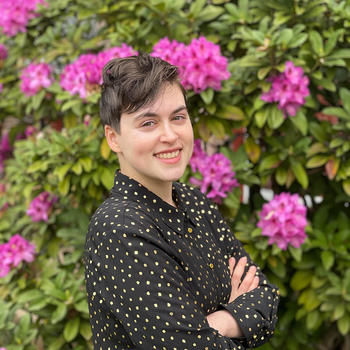
CJ Mandell, Master of Public Health student, was honored with the Impactful Student Activist Award at the Lavender Awards, which celebrates contributions to the LGBTQ+ community. They were recognized for their mentorship as part of Mason’s LGBTQ+ Peer Mentoring program and contributions organizing the university’s Transgender Day of Remembrance event.
“There are many reasons to be active in the community. When it comes to the LGBTQ+ community, this is a group that is facing political and social backlash that impacts our quality of life. There are people of various backgrounds that face marginalization within the systems that exist, and we should all be committed to recognizing and dismantling these structures. Activism can help create a better world, but it requires us to maintain hope and motivation to do the work needed to get there,” said Mandell.
With their MPH, Mandell wants to improve health outcomes for underresourced groups and regions by discovering health gaps, engaging in research, and developing solutions.
“Currently there is a need for LGBTQ+ health and social support services, especially for younger people with fewer resources. Empowering all individuals to be able to express themselves, live freely, and have access to appropriate health care is the way that this activism can create real impact and cultural shifts towards acceptance and support for all people,” said Mandell. “Right now, community engagement starts at a smaller, local level within Mason but eventually this research can support funding requests for programs that fill needs for queer people across the state in areas with disparities in care.”
